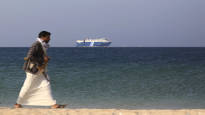A small area thousands of kilometers away has also made headlines in Finland: For example, the furniture giant Ikea and the goods store Tokmanni normally transport their products on cargo ships across the Red Sea towards Finland, but lately Yemen’s Houthis have attacked cargo ships with drones and missiles.
The busy trade route has actually been explosive for years and has attracted the interest and competition of major powers in the region for a long time.
The Red Sea is a narrow and long sea area between Africa and the Arabian Peninsula. The location of the sea is significant as it connects the Indian Ocean to the Mediterranean Sea via the Suez Canal.
Without this channel, ships coming from the Indian Ocean would have to travel about two weeks longer.
The effects of the tense situation in the Red Sea are not limited to the Horn of Africa and the Arabian Peninsula, but extend to Finland.
In this story, we go through what the Red Sea’s relationship with the world is like.
A hub for international trade
The Red Sea is one of the world’s busiest trade routes. The tense situation can have far-reaching effects on the world economy.
The effects would be felt especially in Europe, as an estimated 40 percent of the trade between Europe and Asia goes through the Red Sea and the Suez Canal.
Worldwide, approximately 12 percent of trade normally travels along the route.
The contradiction in the Red Sea, at the meeting point of two worlds, is obvious. Consumer goods such as televisions, cars and oil products from the Persian Gulf are brought to Europe through the unstable region.
– You can well imagine how a poor nomadic family on the beach watches when Maersk’s huge giant container ship passes by a few kilometers away.
This is what the researcher says Risto Marjomaa, which specializes in, among other things, global history, wars, conflicts and Africa. He works as a university lecturer in history at the University of Helsinki.
The Danish shipping giant Maersk is one of the many shipping companies that circumnavigate the Red Sea and now see the Suez Canal from afar. The economic publication Bloomberg has characterized it the maritime crisis as the worst disruption to global supply chains since the corona pandemic.
Among other things, oil and LNG, i.e. liquefied natural gas, flow to Europe through the Red Sea, which partially replace dependence on Russian energy. The security of energy transport is therefore fundamentally related to the goals of foreign powers in the region.
The United States has sent a coalition to the Red Sea, the purpose of which is to secure commercial shipping.
It is in the interest of all parties that international trade runs without problems, reminds the researcher Olli Ruohomäki.
Ruohomäki works as a visiting leading expert at the Foreign Policy Institute. His expertise includes, for example, the Middle East and the Horn of Africa region.
– That is the main reason why all the players are there, says Ruohomäki.
The strategic location of the Red Sea and the Horn of Africa attracts major powers. The interests of the countries operating in the region are commercial and geopolitical.
The great powers’ interest in the Red Sea and the Horn of Africa is not new. The United States and the Soviet Union competed for power in the region already during the Cold War.
Both the great powers and the regional powers of the Middle East have rekindled their interest in the region. The region has been restless for a long time, and the background is influenced by, for example, the pirate situation in Somalia in the early 2000s.
Now tiny Djibouti is in a special position. The strategic location of the Horn of Africa state has led to a special situation, when one country after another has established its bases there.
China opened its first military base outside the country’s borders there in 2017. In addition to China, at least the US, French, Italian and Japanese military bases are located within a few kilometers of each other in Djibouti.
– If a major war ever breaks out in the world, at least there will be a lot of banging from the port of Djibouti, researcher Risto Marjomaa laughs.
Marjomaa considers Djibouti’s situation to be unique in world history.
– I don’t remember ever hearing that such a warport trade had taken place.
There would also be enough new arrivals, as Djibouti is home to the Red Sea’s only deep-sea port. For example Saudi Arabia has told of his plans to build a military base in the country.
Military bases and foreign ports are not limited to Djibouti’s coast. For example, Russia signed in early 2023 of the naval base of the preliminary agreement with Sudan. The countries of the Persian Gulf and Turkey are also trying to strengthen their influence in the region.
The increasingly strong presence of foreign powers in the region has brought to the table overlapping conflicts and goals. One significant question has emerged is the attitude towards Israel.
The Iran-backed Houthis say their strikes in the Red Sea are a countermeasure to Israel’s strikes on Gaza. The war in Gaza has been feared to spill over into the Red Sea.
